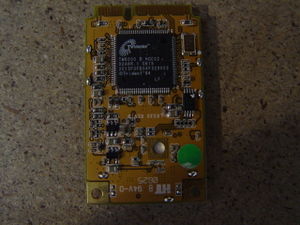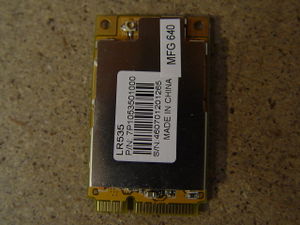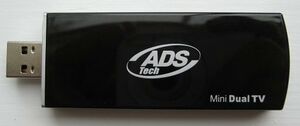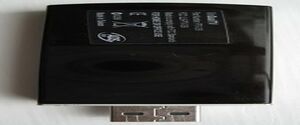Trident TM6000: Difference between revisions
(Added ADSTech Mini Dual TV) |
m (added model number for ADSTech) |
||
| Line 21: | Line 21: | ||
* LifeView LR535 mini-PCIe card (USB Id 10fd:0535) |
* LifeView LR535 mini-PCIe card (USB Id 10fd:0535) |
||
[[Image:lr535_a.jpg|thumb|center]][[Image:lr535_b.jpg|thumb|center]] |
[[Image:lr535_a.jpg|thumb|center]][[Image:lr535_b.jpg|thumb|center]] |
||
* ADSTech Mini |
* ADSTech Mini Dual TV (PTV-339) |
||
[[Image:Adstech-minidualtv.JPG|thumb|center]][[Image:Adstech-minidualtv-back.JPG|thumb|center]] |
[[Image:Adstech-minidualtv.JPG|thumb|center]][[Image:Adstech-minidualtv-back.JPG|thumb|center]] |
||
Revision as of 13:29, 26 September 2007
The TV-Master TM6000 is an integrated Video decoder and USB bridge IC from Trident.
Roadmap
A improved driver with analogue TV support is currently being developed. DVB-T seems to be working fairly well in an experimental driver, which can be found on this page.
Developers
Michel Ludwig (michel.ludwig gmail.com)
Acknowledgements
The hosting of the driver files has been generously provided by François Beerten! Thanks a lot!
Devices
Driver development in progress:
- Freecom DVB-T & Analog TV USB Stick (USB Id 14aa:0620)
- Moka Hybrid TV receiver (USB Id 14aa:0620)
- LifeView LR535 mini-PCIe card (USB Id 10fd:0535)
- ADSTech Mini Dual TV (PTV-339)
Chips used:
- Tuner: Xceive XC3028
- Demodulator: Zarlink ZL10353
- USB bridge + Video decoder: TV-Master TM6000 from Trident Shanghai
If you discover that a device that is not listed here actually works with the driver, please report it to the developers!
Experimental Driver
- Due to high demand, the experimental driver is now available to the public. It provides basic DVB-T support.
Disclaimer: The experimental driver was never intended to be released. The code contains lots of ugly hacks and no guarantee can given that it is even working at all. Moreover, despite the fact that the driver has been used for several months, the extremely unlikely case of causing hardware damage cannot be fully excluded! In summary, you are using the driver at your own risk!
Additional Warning: It is recommanded to disconnect the USB stick after having stopped watching TV as there is currently no instruction implemented to disable the decoding of the TV signal.
- Compilation/Installation Instructions
In short, the driver code needs to be copied into a v4l-dvb tree. More detailed instructions are given below.
Please note that you need the Mercurial version control systems installed on your system.
Step 1: Clone a v4l-dvb tree in a directory of your choice $hg clone http://linuxtv.org/hg/v4l-dvb Step 2: Apply the Makefile patch to the tree (which allows to build the driver later on) $ cd v4l-dvb $ wget http://colabti.de/~feb/tm6000-makefile-dvb-tree.patch $ patch -p1 < tm6000-makefile-dvb-tree.patch Step 3: Download the driver and extract it $ cd linux/drivers/media/video/ $ wget http://colabti.de/tm6000/tm6000.tar.gz $ tar xvzf tm6000.tar.gz Step 4: Compile everything $ cd ../../../../ $ make Step 5: Install everything $ su -c "make install" Step 6: Remove all the V4L/DVB modules that are currently loaded (or alternatively reboot the system) and load the driver module $ su -c "make rmmod; /sbin/modprobe tm6000"
- Firmware
The firmware necessary for the device currently needs to be extracted from the driver files on the installation CD.
Step 1: Copy the file "tridvid.sys" from the CD into a directory of your choice Step 2: Extract the firmware files $dd if=tridvid.sys ibs=1 skip=145441 count=2632 of=tm6000-firmware1 $dd if=tridvid.sys ibs=1 skip=148089 count=3870 of=tm6000-firmware2 Step 3: Copy the firmware files to the firmware directory $su -c "cp tm6000-firmware1 /lib/firmware; cp tm6000-firmware2 /lib/firmware"
- If the compilation and the extraction of the firmware was successful, you should be able to watch TV via DVB-T now! If you want, you can report your geographical location to the developers, so that a list which contains the locations where the driver is working can be kept.
Look-Alikes
Devices which look like this one:
- Yakumo QuickStick TV Easy. Article and photos of the PCB: http://www.svethardware.cz/art_doc-153F40C514B8C470C125723F0072F0DD.html



